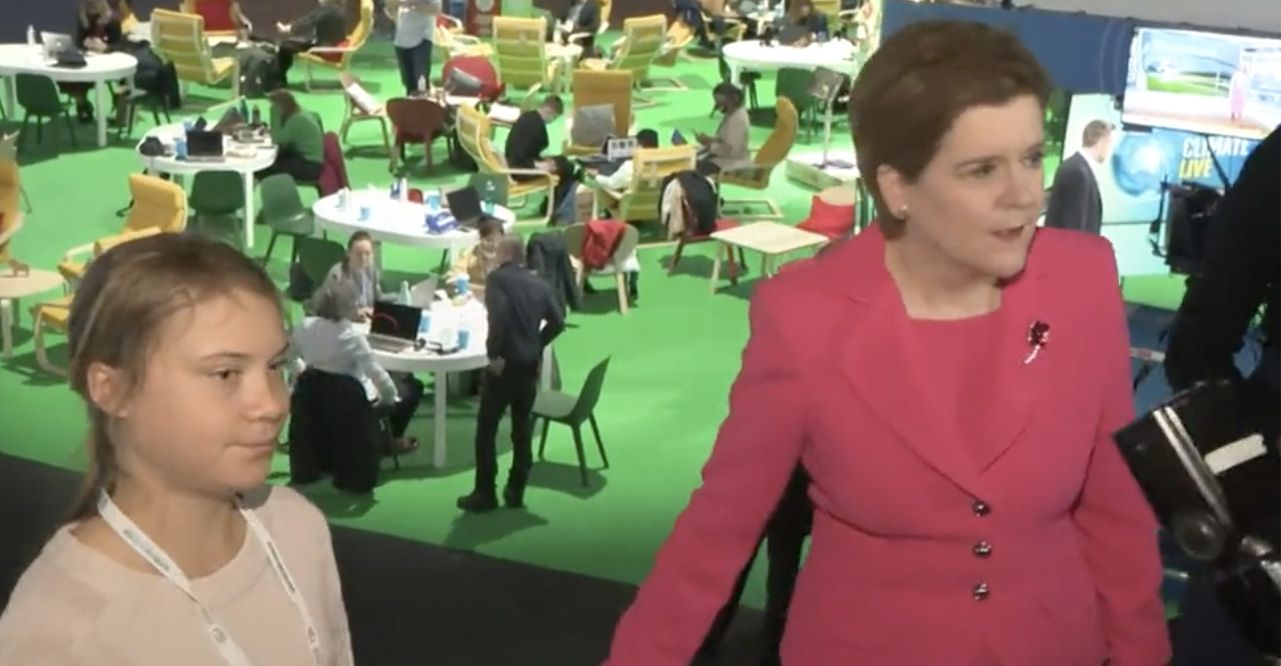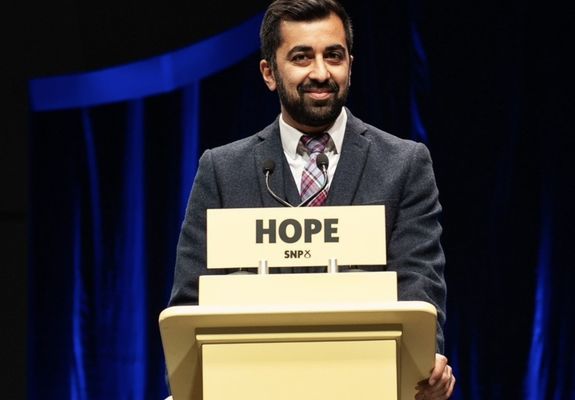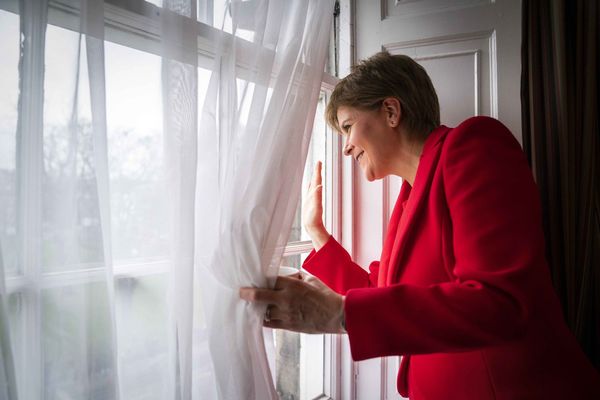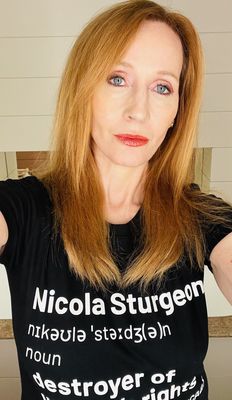THEY were almost all men.
When world leaders shuffled in to place for their grand team photo at the Glasgow climate summit, it was hard not to notice their overwhelming gender profile. Of the hundred or so dignitaries gathered in Scotland’s biggest city, only a handful were women.
Their official snapshot, taken in the grand central hall of Glasgow’s showpiece Kelvingrove art gallery, was a sea of black and navy blue suits.
Off to one side was outgoing German chancellor Angela Merkel. Behind her was Mia Mottley, the Barbadian premier who had just lashed out at rich nations for failing to support poor ones affected most by climate change.
Kelvingrove Museum hosts male dominated Old World Order soiree. pic.twitter.com/ZJqk4080L6
— jack sloan art (@jacksloanart) November 3, 2021
There was one woman most obviously missing from the picture: Scottish First Minister Nicola Sturgeon. Instead, front and centre, was the characteristically dishevelled figure of Boris Johnson, her political nemesis. Or, as Scottish nationalists see him, a living, breathing advert for independence.
The summit, Cop26, to give it its official name, is one of the most important international gatherings in recent years. Its main goal: to find ways to limit global heating as much as possible.
But on its margins – irrelevant, no doubt, to most delegates – there was a strange little para-diplomatic battle over what role Scotland should play at the summit and, more broadly, in the world.
Sturgeon does not lead an independent sovereign state. Indeed, Scots remain divided roughly 50-50 over whether they want her to. So there is a strong case to be made that she should not have been in a photo of world leaders: she is, after all, not yet one of them.
But Johnson made it clear from the get-go he wanted Sturgeon out of the limelight and off the international stage.
Nicola Sturgeon has met climate activists Greta Thunberg and Vanessa Nakate at COP26 summit. pic.twitter.com/sONE6awEJY
— STV News (@STVNews) November 1, 2021
Speaking way back in 2019, he said: “I guess I don’t mind seeing a Saltire or two on that summit, but I want to see a union flag – I don’t want to see Nicola Sturgeon anywhere near it, because the Scottish Nationalist Party didn’t secure that summit in Glasgow, it was the United Kingdom Government.”
Johnson – who, by the way, routinely and mischievously misnames the Scottish National Party – had his way on flags. The Union Jack flew above Cop26, much to the irritation of pro-independence daily The National. It was so annoyed it splashed on what it saw as a slight.
But Johnson could not keep Sturgeon out of Cop.
The first minister has an international role and Scotland, as a devolved nation, has an embryonic network of diplomatic and trade missions, including in Ireland. Indeed, this activity, mostly focused on devolved areas of competence, like the environment, predates not just the coming of the SNP to power but devolution itself.
That does not mean all unionists like it. Indeed, as Scottish-American foreign policy analyst Anthony Salamone pointed out this week, all Scottish international contacts are now viewed firmly through a prism of constitutional politics.
New article by Anthony Salamone – Opinion – Scotland: Host of COP26 but Divided on Its Role in the World https://t.co/SP6CMcYpeh
— E-International Relations (@E_IR) November 2, 2021
Some unionists have found it hard to see Sturgeon hobnob with presidents and prime ministers around Cop, including hosting them at her official residence, Bute House in Edinburgh. It all, I suspect, looks much too like the role of the leader of a sovereign country, even if it is firmly within the remit of devolution.
The hardest thing for some unionists was seeing an official picture, released late on Wednesday, of Sturgeon smiling with Joe Biden after receiving an official gift.
This last week or so Sturgeon has met the presidents, premiers or politicians from countries and territories as diverse as Zambia, Palestine, Malawi, Belgium, Vietnam, Iceland, Wales, London, and Northern Ireland. She has also met Greta Thunberg, David Attenborough and other campaigners and has done wall-to-wall interviews with international media. She has even chatted to Johnson. The pair might make awkward co-hosts, but Sturgeon says they have set aside their differences for a Cop truce. “We will be pulling in the same direction to get the outcome the world needs,” she said.
Johnson said the SNP leader had been “very helpful” after they did an uncomfortable-looking elbow bump. It was their first physical meeting in two years. Sturgeon – perhaps undiplomatically – had just described Johnson as a “fragile male ego” in a cover article in fashion magazine Vogue.
Critics, nevertheless, accused Sturgeon and her Green junior coalition partners of pursuing a “divisive obsession” with independence during Cop while the world came together to fight climate change.
A nation in waiting… pic.twitter.com/4ie1VMie7D
— Miles Briggs MSP (@Miles4Lothian) November 3, 2021
The SNP – it has to be said – paid for adverts in big newspapers welcoming delegates to Scotland, which, somewhat controversially, they called a “nation in waiting”. (Most Scots already think of Scotland as a nation, just not a state, so the phrase jarred for some). Some wags mocked the slogan. Scotland, they joked, was a nation in waiting, sure, but for its bins to be collected: Glasgow’s refuse workers downed buckets during Cop in a national pay dispute.
Sturgeon denied she was using the summit to relaunch her independence campaign, currently effectively dormant amid rows over whether she has powers to hold another referendum, as she plans, in 2023.
“This conference is about climate change and I don’t think anybody hearing or listening or speaking to me over the course of yesterday or today would think I’m focused on anything other than that.”
Scotland has more ambitious carbon targets than the UK, though it has recently narrowly missed them. Its famously bad weather has helped it develop an emerging profile as a renewable energy powerhouse, though largely using imported technology.
UN Secretary-General António Guterres picked out Scotland for praise over its climate efforts. That will have been music to Sturgeon’s ears. And very annoying for Johnson,
But expert Anthony Salamone, in an essay this week, stressed rival climate diplomacy efforts from Scotland and the UK were firmly based at an audience closer to home, not in the UN.
UN chief expresses “enormous gratitude” to Glasgow for hosting #cop26 climate summit
— Glenn Campbell (@GlennBBC) November 2, 2021
@antonioguterres also praises Scottish efforts to tackle climate change including “very clear target” to hit net zero before 2050 @NicolaSturgeon pic.twitter.com/4zxdaI2F9B
“London will want to show that the UK remains a force in the world and that Scottish independence is unnecessary, if not dangerous,” he explained. “Edinburgh will make the case that Scotland would thrive as a European small state which was part of the EU.
These arguments will be weaved, mostly subtly, into the two governments’ engagements around the Cop. The principal target of these efforts will be the Scottish public.”
How will Scots react to such machinations? That, I am afraid, will almost certainly depend on where they already stand on the constitution.








